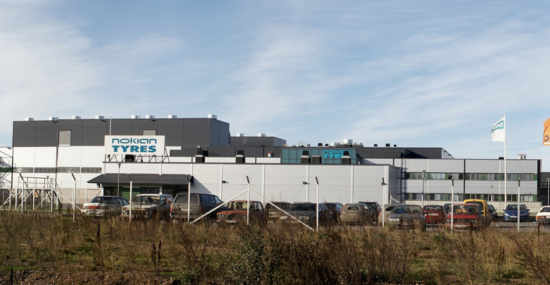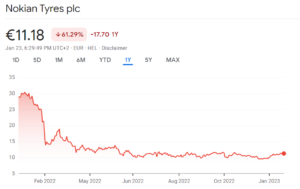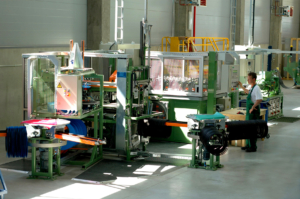Is Nokian Tyres a takeover target?
 Nokian Tyres’s controlled exit from Russia means the company must replace the 80 per cent of passenger car tyre production capacity the pictured Russian operation (now owned by Tatneft) used to provide (Photo: Nokian Tyres)
Nokian Tyres’s controlled exit from Russia means the company must replace the 80 per cent of passenger car tyre production capacity the pictured Russian operation (now owned by Tatneft) used to provide (Photo: Nokian Tyres)
How the Russia-Ukraine war, the company’s low share price and other challenges make Nokian Tyres prime takeover material for a premium brand with the money and desire:
The Russian-Ukraine war really shook up the European tyre manufacturing industry during 2022. Those companies running tyre manufacturing operations in Russia were particularly affected, but due to the effects of sanctions against Russian-produced petrochemicals, it also had a knock-on impact on those sourcing input materials such as carbon black and synthetic rubber from Russia. Most tyre manufacturers have now found new sources for their input materials. And there has been something of an exodus of global tyre manufacturers from Russia since they calculated that the limited impact on their production capacity was not worth the ethical and economic cost of close association with Russia. Likewise, Nokian Tyres said it would embark on a “controlled exit” from Russia in June 2022. The difference for Nokian is that it made 80 per cent of its car tyres in Russia and that these accounted for 20 per cent of the Finnish tyremaker’s net sales.
Those figures mean that Nokian has been up against a deadline to replace lost high-quality passenger care tyre production capacity since June 2022. In simple terms, Nokian executives want to swap the Russian tyre manufacturing operation roughly like-for-like with an even more eco-friendly plant in Romania. The latest news on that front is that the Romanian government is chipping in with roughly 100 million euros of state aid. So far, so good. However, that figure will be spread over about five years and only represents a fraction of the estimated 642.4 million euros necessary to complete the project. Furthermore, the fact that the Romanian state aid is being spread over five years tells us something about how long it will take to get the proposed new tyre plant’s tyre manufacturing operation up to speed. For a company that needed to replace its passenger car tyre capacity yesterday, five years is a very long time. Even Nokian’s own 2025 estimate can’t come soon enough.
That’s the reason for the company’s January 2023 announcement of a $174 million cash injection aimed at adding light truck tyre production to its Dayton, USA tyre plant. But, by definition, that only addresses light-truck tyre demand.
Will the off-take deal take-off the pressure?
That’s where Nokian’s off-take agreement with Sentury comes in. First off, it is worth noting that Nokian expects Sentury to provide 1-3 million tyres a year between 2023 and 2027. If Nokian expects Romania to hit full speed by 2025, then why ink a deal to 2027? Of course, everyone has to plan for contingencies but read alongside Nokian’s 2025 target for the construction of the new Romania plant and the Romanian government’s five-year state-aid plan, both points lend support to the suggestion that two years to build the new factory is on the optimistic side of things.
Furthermore, in order for Sentury to supply 1-3 million tyres a year to Nokian, the Qingdao, China-based tyre manufacturer has to have that kind of capacity available itself. Sentury runs a very modern tyre factory in Qingdao, a more conventional production line, and another modern operation in Thailand. A brand of Nokian Tyres’ stature will surely be wanting its tyres to be manufactured on Sentury’s most modern production lines. That being the case, the question is: do those production lines have enough excess capacity to produce up to 3 million tyres a year just for Nokian? As far back as 2015, Sentury executives told us that they were producing as much as 2 million tyres a year (across all its own and contract brands) destined for the UK market alone, with a similar total figure across the rest of the European markets. Admittedly the UK figure may have been something of peak, but a European total of 4 million tyres could be feasible – something that makes Nokian’s request for as many as 3 million tyres a year appears to be something of a tall order. Indeed, that is especially the case in light of the fact that Sentury is currently committed to new tyre production bases in both Spain and Morocco. Questions have been raised about the likelihood of both projects being completed. One industry insider pointed to the erstwhile Sentury US factory project as a reason to wonder. But even if one or both of those two projects are completed in record time, they will still come at least two years into the Nokian-Sentury offtake agreement and therefore don’t solve Nokian’s tyre production pressures.
With all that in mind, Tyres & Accessories asked Nokian how preparations for its off-take deal with Sentury are going and specifically: Is Sentury producing Nokian tyres yet? And are you happy with the quality and volumes?
The official line is that: “…preparations are going in line with plan. The start-up of production will be in the first half of 2023 and the first tyres will be in the market in the second half of 2023.” In other words, the off-take agreement is broadly on schedule. Regarding quality control, certain measures are in place, with company representatives saying: “Tyres manufactured at Sentury’s production facility are designed by Nokian Tyres and tested in Nokian Tyres’ testing facilities to meet our high requirements for safety and quality.”
Tatneft, tyre moulds and intellectual property
Nokian Tyres’s controlled exit from Russia involves the sale of its St. Petersburg tyre production location to Tatneft for around 400 million euros. Tyres & Accessories heard that the precise figure is 412 million euros, but Nokian representatives won’t confirm or deny that. The more pressing point was that the same source suggested that Tatneft has reduced its offer for the Nokian Tyres St Petersburg location. Again, Nokian representatives refused to confirm or deny those reports, stating: “since the negotiations are ongoing, no further details on the transaction can be given at this stage.”
However, Nokian Tyres did concede that there are “substantial uncertainties” relating to the timing of the Tatneft deal’s closure. That revelation came to light in answer to T&A’s questions back in December 2022 and resulted in company spokespeople stating: “The transaction is subject to approval by the relevant regulatory authorities in Russia and other conditions, which creates substantial uncertainties related to the timing, terms and conditions and the closing of the transaction.”
Nokian officials didn’t say how many, but they did confirm that “Yes. Due to the counter-sanctions, we have not been able to transfer moulds from Russia.”
That may be. But assuming that the St Petersburg factory’s price tag does stay as high as the 400-to-412-million-euro levels we have heard about, to what extent does that reflect the value of Nokian’s former Russia production base? Industry sources told T&A that the St Petersburg factory should be valued at as much as 1 billion euros. And Nokian representatives have been telling us throughout the plant’s life that the Russian factory is filled to the gills with the most modern tyre manufacturing machinery out there. What that means is – as a stock market listed company – Nokian will have to report a charge of up to 600 million euros in its accounts if the factory is sold for 400 million euros and the 1-billion-euro estimate was anywhere near the market value.
Source: Google Finance
Commenting on that particular question, Nokian representatives reminded us – as you would expect – that they “don’t comment on market rumours”, adding: “As a stock listed company, we disclose all relevant information related to Nokian Tyres’ business promptly and consistently as a company release to all stakeholders simultaneously.”
And that’s precisely the point. The significance of all these sums is that a 400-to-600-million-euro charge is exactly what you don’t want to have to put on the balance sheet when your share price has plummeted more than 60 per cent during the last year (see chart). It is true that the share price fall is largely due to the Russia-Ukraine war, but the specific reason is because of Nokian’s historic strategic reliance on Russia-based tyre production capacity, which it hasn’t yet replaced. More concerningly, current share price levels suggest investors remain as-yet unconvinced of the proposed solutions.
Nokian tyre moulds stuck in Russian legal limbo
But that’s not all. As things stand, many Nokian Tyres moulds – some sources say as many as 1200 – are stuck in a kind of Kaftka-esque legal limbo. Nokian officials didn’t say how many, but they did confirm that “Yes. Due to the counter-sanctions, we have not been able to transfer moulds from Russia.”
That reality presents obvious problems when it comes to defending the company’s intellectual property (IP) rights. With this in mind, we asked Nokian Tyres representatives how they understand the present legal situation in Russia as it pertains to protecting its products from infringement of its IP, specifically asking: Since it is difficult to enforce copyright legislation in Russia, how do you plan to protect Nokian Tyres’s intellectual property?
They answered by conceding that it is indeed hard to protect the company’s intellectual property: “The regulatory environment in Russia is uncertain at the moment. However, we are using all available legal and contractual means to protect our intellectual property.”
There are other potential solutions. Selling the Russian plant to Tatneft is not the only card on the table. For example, Nokian could potentially mothball the St Petersburg plant, take a smaller cost hit in the short term and wait for better days. Some might argue that such a move is a better option than taking a big hit on the sale of the St Petersburg factory followed by a punt in Romania.
Premium brand suitors on the horizon?
Nokian’s Russian tyre production capacity is reportedly powered by some very modern and highly automated manufacturing machinery (Photo: Nokian Tyres)
Then there’s the nuclear option. With Nokian’s share price trading at around 11 euros (down from roughly 35-euro levels during 2022) and with questions raised about the speed at which the company’s passenger car tyre capacity pressures can realistically be eased, a third party might want to get involved. Market analysts have been saying that the tyre sector is ripe for consolidation for years. Yokohama’s acquisition of Trelleborg Wheel Systems is one example of that principle in action. Yokohama has openly expressed its interest in establishing a European manufacturing base, but that plan was for a greenfield site somewhere around the Czech Republic/Poland area. Moving to the purchase of an entire European brand and its international manufacturing operation is quite a different kettle of fish and would therefore require a significant strategic shift.
Furthermore, Yokohama is currently around the ninth largest in the world (albeit rising) and the same sources that talk of consolidation also suggest that the only way the very biggest manufacturers can grow is by acquisition, something Goodyear exemplified with its acquisition of Cooper.
Speaking of Japanese brands, the most obvious name to throw into the ring is Bridgestone. Not only has there been an off-take partnership between Nokian Tyres and Bridgestone, until January 2020 Bridgestone held around 10 per cent of Nokian. At that point, Bridgestone reduced its share to around 3 per cent of Nokian Tyres. That might not sound like a huge amount, but consider the highly diverse spread of Nokian’s shareholders. The current largest shareholder is Solidium Oy, which is “a holding company wholly owned by the State of Finland” with the stated aim of strengthening and stabilising Finnish ownership. Solidium Oy holds around 10 per cent of Nokian Tyres shares.
It is also worth noting that Bridgestone has historically held as much as 18.9 per cent, a position it maintained until March 2003. At another point, the European arm of the Japanese tyremaker held around 15 per cent until 2014. In other words, Bridgestone is historically comfortable with significant Nokian shareholdings.
Back to the present day, and the subject of Nokian’s current largest shareholder, the Finnish-state-linked Solidium, it is no surprise to learn that – as of 31 December 2022 – at least four more of Nokian Tyres’s top 10 shareholders are Finnish pension funds. The result is that Finnish-based, stability-focused funds play a commanding role in the ownership of Nokian. But shares are traded entities. And while the top 10 together control 18.96 per cent of Nokian’s shares, 50.55 per cent of shares are held by those with between 1 and 100 shares and more than 95 per cent of shareholders are described as “households”. Put another way, a takeover offer is possible. The question remains: who would make such a bid?
Apart from the premium tyremakers, the only other really plausible option would be for one of the fast-moving large Chinese tyremakers to make an approach. With Linglong’s Serbia plant already on-stream and set to officially open soon, the other large Chinese tyremakers such as ZC Rubber, Sailun et al may want to make their mark in the complex and diverse European markets with a strong brand and manufacturing base inside Europe. However, most of those are already heavily committed to expansion projects in the Far East. Furthermore, the aforementioned stability-focused major shareholders are likely to be more open to a bid from a leading name – especially if that name is already a known quantity.
On the subject of Nokian Tyres’ historically low share price, something that is at the root of the whole takeover thesis, we asked officials how the company is planning to restore confidence in its manufacturing power and therefore Nokian Tyres’ share price. Their answer?
“We focus on building the new Nokian Tyres without Russia. Our key priorities are adding new capacity, retaining a competitive premium product portfolio and serving our customers’ needs in the best possible way. We will invest approximately 650 million euros in a new greenfield tyre factory in Romania – the first zero CO2 emission factory in the tyre industry. The investment is a vital element in getting additional capacity and enabling our future growth. At the same time, we have continued to increase capacity at our factories in Finland and in the US, published the first off-take production agreement, and developed and launched high-performing new products within our core segments.”
However, Nokian officials “don’t comment on the company’s share price.” For business and regulatory reasons, that’s understandable, but one has to ask the questions: With shares trading at these levels has Nokian Tyres received any takeover offers? Would Nokian Tyres consider any such bids? And if so, who from? As you might expect, those queries were flat-batted with a sterile no comment response.
Chain reaction?
It is evident that a clear chain of events led up to the circumstances Nokian Tyres now finds itself in. The Russian invasion of Ukraine led to sanctions and both ethical and shareholder pressure for Nokian Tyres to leave Russia. That resulted in an 80 per cent hole in Nokian passenger car tyre production capacity, something that is likely to be a large part of what spooked investors and led to the company’s current historically low share price. And the low share price makes the company attractive to suitors. Meanwhile, as we have seen, questions as to whether or not the new Romania plant can be constructed in time combined with questions relating to the capacity of the company’s off-take contingency remain. Therefore, swiftly closing the passenger car tyre production gap is critical to the future of Nokian Tyres.






Comments